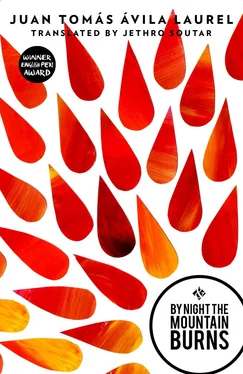Juan Ávila Laurel - By Night the Mountain Burns
Здесь есть возможность читать онлайн «Juan Ávila Laurel - By Night the Mountain Burns» весь текст электронной книги совершенно бесплатно (целиком полную версию без сокращений). В некоторых случаях можно слушать аудио, скачать через торрент в формате fb2 и присутствует краткое содержание. Год выпуска: 2014, Издательство: And Other Stories Publishing, Жанр: Современная проза, на английском языке. Описание произведения, (предисловие) а так же отзывы посетителей доступны на портале библиотеки ЛибКат.
- Название:By Night the Mountain Burns
- Автор:
- Издательство:And Other Stories Publishing
- Жанр:
- Год:2014
- ISBN:нет данных
- Рейтинг книги:5 / 5. Голосов: 1
-
Избранное:Добавить в избранное
- Отзывы:
-
Ваша оценка:
- 100
- 1
- 2
- 3
- 4
- 5
By Night the Mountain Burns: краткое содержание, описание и аннотация
Предлагаем к чтению аннотацию, описание, краткое содержание или предисловие (зависит от того, что написал сам автор книги «By Night the Mountain Burns»). Если вы не нашли необходимую информацию о книге — напишите в комментариях, мы постараемся отыскать её.
By Night the Mountain Burns — читать онлайн бесплатно полную книгу (весь текст) целиком
Ниже представлен текст книги, разбитый по страницам. Система сохранения места последней прочитанной страницы, позволяет с удобством читать онлайн бесплатно книгу «By Night the Mountain Burns», без необходимости каждый раз заново искать на чём Вы остановились. Поставьте закладку, и сможете в любой момент перейти на страницу, на которой закончили чтение.
Интервал:
Закладка:
When she thought it had been enough, she would stand up, put the chair back, say her farewells and come back downstairs, and not with the frowning face of a failed encounter, but more smiley than ever. She must have known something we didn’t, we who lived with the man. In any case, grandmother’s niece was older than we were, as we were the children her cousins had brought into the world, so she knew more things than we did. But she was the same age as our mothers, so we found it strange that none of them enjoyed the same privileged relationship with him that she had. Or could the answer lie simply in her boldness and not the hidden explanations I looked for?
Like all the inhabitants on our Atlantic Ocean island, we lived in the big village during the rainy season and went to the settlements in the dry season, to eat whatever we could find there. In most families the change of season presented few problems, for the whole family went to the settlements and the house in the big village was locked up for the season, sometimes with keys, more typically with two sticks crossed over the door. But in our family we couldn’t all go to the settlements, for there was one family member who never made the journey: grandfather. He never made the journey because of two invalidating reasons, if that makes sense. For a long time I thought grandfather was an invalid, which is why that expression popped out just now. It would have had to have been a totally debilitating invalidity, for he did absolutely nothing. But anyway, the two reasons why grandfather couldn’t go with us to the settlements in the south were one, he couldn’t walk there, and two, he couldn’t paddle a canoe. The fact that he couldn’t paddle a canoe was what finally convinced me he was an incomer and that he simply hadn’t learned since coming to the island. Because every man and grown-up boy on our Atlantic Ocean island knows how to paddle.
The problem was we couldn’t leave grandfather on his own in the big village. And the reason wasn’t that he didn’t want to be left on his own, for doubtless he would have liked it, but rather that there’d be nobody there to cook for him. So grandmother arranged it for her daughters to take turns staying with him, in three shifts of one month, which was how long the dry season lasted. I didn’t think anyone needed to stay behind with him to make him food, for I didn’t think the man ate. I only learned of this requirement the year when it was my mother’s turn to stay with him, by which I mean the mother who’d brought me into the world and with whom I was very much in love at the time, for I’d only just found out she was my real mother. I missed her, and if it hadn’t been for the fact that by being in the big village I’d have missed my brothers and sisters, and missed out on all the fun being had in the settlements, I’d have asked to go with her. But I’d have been on my own, for my brothers and sisters were happy where they were, eating birds that were preserved in salt after they’d been caught by those who’d learned how using traps or a sticky resin from a tree.
Sometimes grandmother’s niece invented a reason why she had to stay in the big village during the dry season and said it would be no trouble to take food to grandfather every day. When this happened none of my mothers had to take a turn to stay behind and cook. And I kept thinking: but the man doesn’t even eat! What did he eat? Who was he? What was going on with that crazy haircut? In truth there were a great many things that puzzled me about my grandfather. For one thing, why did he not go to the vidjil , the recreation hut the men had down by the beach? He never went, maybe because he didn’t like it there but more likely because he refused to leave the lookout that was his balcony at home. That a man living on an island in the middle of the Atlantic Ocean should refuse to have anything to do with the sea, and never go to the vidjil , was a strange and striking thing. You actually did nothing at all at the vidjil , so it was especially strange that he didn’t want to go somewhere where you did nothing and where I’d have thought he’d be happier. The men at the vidjil were about the same age as him, they would have reminisced about old times and talked about things he knew. Did he not go because he didn’t know the others, didn’t know about the same things? It was possible, and this reinforced my belief that he was an incomer.
That he didn’t go to the vidjil because of his views or tastes was of no interest to anybody. That was his business. But it was a great disadvantage to us that he stayed at home. Because, if he had spent long hours at the vidjil , as the other men of his age did, he would have come home at the end of the day with a bundle of fish and we would have eaten more fish than we did. That’s why I found it so incomprehensible that he stayed at home. Because at the vidjil you did nothing and you took home handouts given away by the fishermen when they got back from a day at sea. The thing was, it was customary on the island for the men at the vidjil to help pull the canoe in when a fisherman got back from sea, and to show he was a good man as well as a good fisherman, and to keep our island’s customs alive, the fisherman would hand out a few fish to the men who helped pull him in. Now some of the men at the vidjil were quite old, and some of them no longer could, or no longer would, get up to drag a canoe in. But others, though they too lacked youthful vigour, got up whenever a fisherman came back and, while the strong ones pulled the canoe in, they merely touched it, making sure it was noted that they’d touched it, and with this gesture they qualified for the thank-you handout. It was a kind of begging, a kind of scrounging that was quietly accepted. Or a kind of gentleman’s agreement. Which just left those old men who no longer could, or would, get up from where they were seated. But no fisherman ever failed to show his appreciation to them too, be it because he was fond of a particular old man or because the old man had certain qualities that meant he was somehow esteemed. In truth, all men were esteemed once they’d reached a certain age.
But back to my grandfather and his not going to the vidjil , nor to any other part of the shore where people fished, and to us, as a consequence, eating so little fish. All of my grandfather’s offspring were female, and we, the males, the grandsons, were too young to go out fishing. Was my grandfather not somehow esteemed? Did he not have in him those qualities that meant he’d be given fish even though he’d done nothing? Had he been bad in his youth and that was why he avoided other people, because he’d wronged them and they didn’t like him because of his past?
The one person who made sure we didn’t go too long without eating fish was my grandmother’s lovely niece. From an early age she developed a habit of being charitable towards us, at first giving us fish from her father, then her brothers, and then from the husband she acquired once she’d reached the age of desire. There was never any doubt that girl would find a good husband for she was so lovely.
That we didn’t eat fish because the man of our house didn’t fish and refused to go where he ought to go was no small thing. Because, on our Atlantic Ocean island, if you didn’t fish, or get fish to eat, you didn’t eat. And don’t ask me why we didn’t raise hens, goats or pigs on our island of unknown geographical coordinates. Let’s just say that when we did, they were much more likely to be taken away on boats than find their way into grandmother’s cooking pot. It was said that all the animals we never saw eaten were taken to where our fathers were. There were many of us in my grandmother’s house and all of us had a father in that place you went to by boat, a boat we only ever saw in the distance, from the beach. All of which meant that when we had no fish, grandmother put a hunk of cassava bread in our hands, as dry as a remnant from the fire. And nothing more was said of it. So in order to eat in our house, two adults had jobs to do. It was grandmother’s job, aided by her daughters, our mothers, to make sure there was always a hunk of cassava bread to put in our hands or, when there wasn’t, a mash of something cooked inside a parcel of green banana leaves. And with this, they could be satisfied they’d done their duty. Then it was the man’s turn, and the man of the house could be satisfied he’d done his duty when fish reached the house through his doing, and in sufficient quantity that there was enough to go round. The man of our house refused to have anything to do with the sea; in fact, he built his house turned to face the mountain. Nor could we little men of the house help, as we saw other grandchildren do, grandchildren whose grandfathers took them out to sea to learn how to fish, in exchange for a bit of seasickness and vomiting. Seasickness and vomiting from the grandchildren, I mean.
Читать дальшеИнтервал:
Закладка:
Похожие книги на «By Night the Mountain Burns»
Представляем Вашему вниманию похожие книги на «By Night the Mountain Burns» списком для выбора. Мы отобрали схожую по названию и смыслу литературу в надежде предоставить читателям больше вариантов отыскать новые, интересные, ещё непрочитанные произведения.
Обсуждение, отзывы о книге «By Night the Mountain Burns» и просто собственные мнения читателей. Оставьте ваши комментарии, напишите, что Вы думаете о произведении, его смысле или главных героях. Укажите что конкретно понравилось, а что нет, и почему Вы так считаете.












